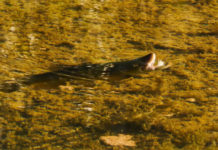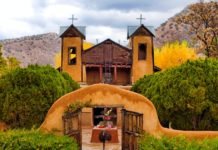Joy and I have recently returned from a week in Colorado; arguably among the most beautifully picturesque of all the states in the Union.
We had the privilege, on multiple occasions, to try our hand at fly fishing.
We had done it only once before on a ranch north of Santa Fe with a professional guide as our instructor.
On that chilly, sunny spring day, Joy landed her first rainbow trout within minutes of stepping into her waders, while I was still trying to put together my fly rod. She did that the whole April day: caught fish, while I watched and applauded, all proud and envious!
We had two guides this trip, one in Black Lake, the other in Telluride; the former on a drift boat in a huge, private lake, the other in the cold and rushing San Miguel River in Cascabel, southwest Colorado.
Once again, Joy, waist deep in the bone-chillingly freezing and fast waters, caught (and released, of course) a lot more fish than I did, and we both enjoyed every single second of those days on and in the water, some of it spent together, some of it spent alone.
They will be for me some of my most memorable moments; when we were connected with one another, with the river, with the fish, with the sun, with the rain, with the earth, laughing, grunting, falling, rising, trying, again and again, to catch those ever-elusive and always gorgeous rainbow, brown, and brook trout with something made to look like a nymph fly sitting or barely sinking at the water’s edge, sometimes successfully, often feeling the hit, setting the hook, and missing, only to try again 1 million times, and loving every second.
That’s fishing for you.
The ancients had a saying: Theology is the queen of the sciences, and philosophy her handmaiden.
In college, my major was biblical and theological studies. My minor was philosophy. It was in that order because, at that time, my relatively small school didn’t have a philosophy major, so I could only minor in it.
For whatever reason, I loved it: philosophy.
The love of wisdom. Who couldn’t love that.
Philosophy has long been regarded as ivory tower nonsense, unnecessarily heady and overly academic words that amount to nothing, to no action, no change, no good for anyone or anything.
Philosophy has gotten a bad rap.
Those who know me will remember that it is philosophy that I read; it is what fills my podcast playlists; it is what pops up in my YouTube feed. I love it. In particular, I am a lifelong student of Stoicism, a relatively obscure philosophical tradition dating back to 300 BCE, and made memorable by the likes of the politician and playwright, Seneca, the slave turned writer, Epictetus, and the last of the five great Roman Emperors, Marcus Aurelius, whose private journal (Meditations) is one of the most profound pieces of philosophical writing we possess.
Not long ago, I was asked why I love it? I had never been asked that before. My answer? Philosophy is where I go to get counsel, to find guidance, to become grounded.
It is in Stoic philosophy that I learn to focus only on what I control, and let go of the rest; to meditate on my mortality every day; to remember that I have the power to have no opinion on the things that threaten to irritate or upset me; to balance the books of my life at the end of each day; to never be heard complaining; to give up suffering imagined troubles; to focus on process, not outcomes, to learn something from everyone I encounter, and; to live as if I had died and come back to life.
These are but a few of the thousands of axioms I have learned while studying the Stoics.
But something else I’ve learned is that books, podcasts, TED talks, and YouTube videos are not the best places to think, reflect, and learn about philosophy.
The rivers and the streams are.
I am blessed and grateful to have experienced many things, to have traveled many places, to have met many people, to have encountered many opportunities, and to have learned many lessons in my forty-seven years.
But there are few experiences that rise to the level of what fly fishing has offered me by way of attentiveness, tranquility of mind, a pause in life’s feverish rush, peace, and quiet.
And in that peace, and in that quiet, I have learned to rest, to listen, all while studying the bubbles on the top of the water, the current, the rock patterns, the depths of the holes, the fallen branches, the wind, and the effect of my tippet and the fly resting on top of the water, waiting to attract, to catch, to net, and to release the ever-evasive trophy.
Fishing; what is it, really? I mean, why do we do it? And who does it? How is it that we can spend so much time trying to outwit a creature whose brain is the size of a pistachio?
How can a leisure pastime claim so many great sacrifices, such that some would willingly leave their house at all times of morning and night, lose their phone (I did!), wade into cold, fast waters, even swear never to cuss or drink again, if only to snag “the one?”
What is it that makes fishing irresistible, like a force of nature, a revelation, a kind of salvation, for some?
Maybe it’s because I’ve not been doing this for very long at all that I really can’t answer that question. But lifelong fishermen and women have said the same: they just don’t know why.
Perhaps it really is as Thoreau wrote: “Many go fishing all of their lives without knowing that it is not fish they are after.” That is my only consolation as I once again geared up, cast out, and reeled in empty hook after empty hook. “I don’t think I’ll catch very much, if anything at all, but at least I’m here.”
It is an amazing thing to tie your knots, cast your line, reel it in, and repeat that process, while trying to land your fly in a precise place to attract that fish you just know is there and waiting for you, all the while, silently contemplating your life, your experiences, your relationships, your way of seeing the world, your faith, your doubt, your death.
That is what happens when you’re on or in the water, in the silence, in the waiting. You’re asking those questions, philosophical questions, and you’re fishing for more than fish, but for answers, for truths, for peace.
No, I don’t think the choice to “go fishing” is the solution to everyone’s problems.
On the other hand, I do believe that if everyone went fishing, there would be considerably fewer problems. Only when you really spend time with yourself can you truly learn to know yourself.
It isn’t particularly complicated. It just takes time.
And fly fishing with my wife in New Mexico and Colorado has shown me that I need to do a lot more of it. After all, the Stoics say that time is our most valuable and non-renewable resource, not money, not possessions.
I think I’ll spend more of mine in the ever-flowing streams of the philosophy of fly fishing, because, at least for a moment, I become aware that I am alive, and one day I won’t be.
Make the most of your life today.
Dr. Jonathan Eric Carroll, KLPC, NCPC, NCCE, is a state-licensed mental health professional, is an ACPE psychotherapist, and is the Founder of The Clinic @ The Montgomery, a center for therapy, parenting coordination, custody evaluation, and business consulting in downtown Owensboro. Dr. Carroll serves also as the Grief Therapist for 10 funeral homes in the region. Visit www.themontgomeryclinic.com.
Dr. Jonathan Eric Carroll, KLPC, NCPC, NCCE, is a state-licensed mental health professional, is an ACPE psychotherapist, and is the Founder of The Clinic @ The Montgomery, a center for therapy, parenting coordination, custody evaluation, and business consulting in downtown Owensboro. Dr. Carroll serves also as the Grief Therapist for 10 funeral homes in the region. Visit www.themontgomeryclinic.com.
Credit: Source link































